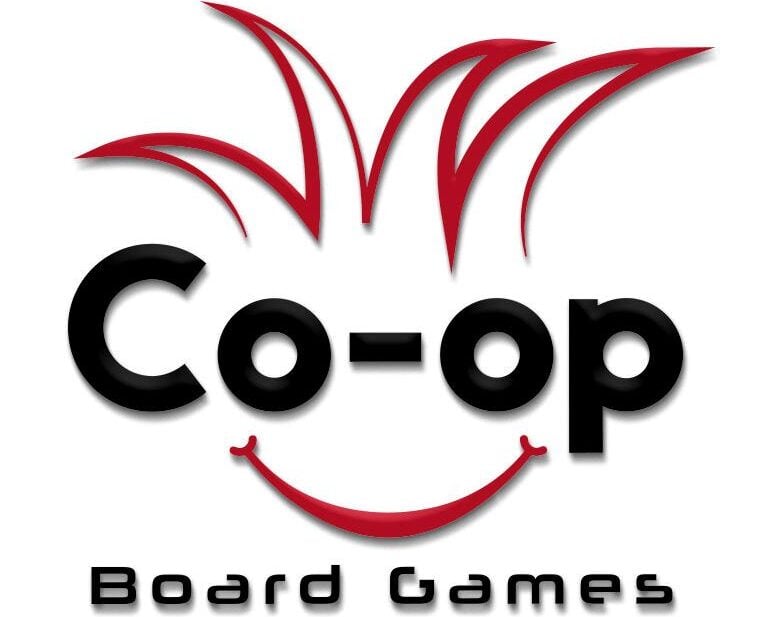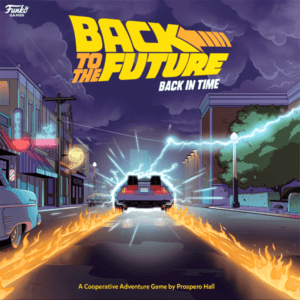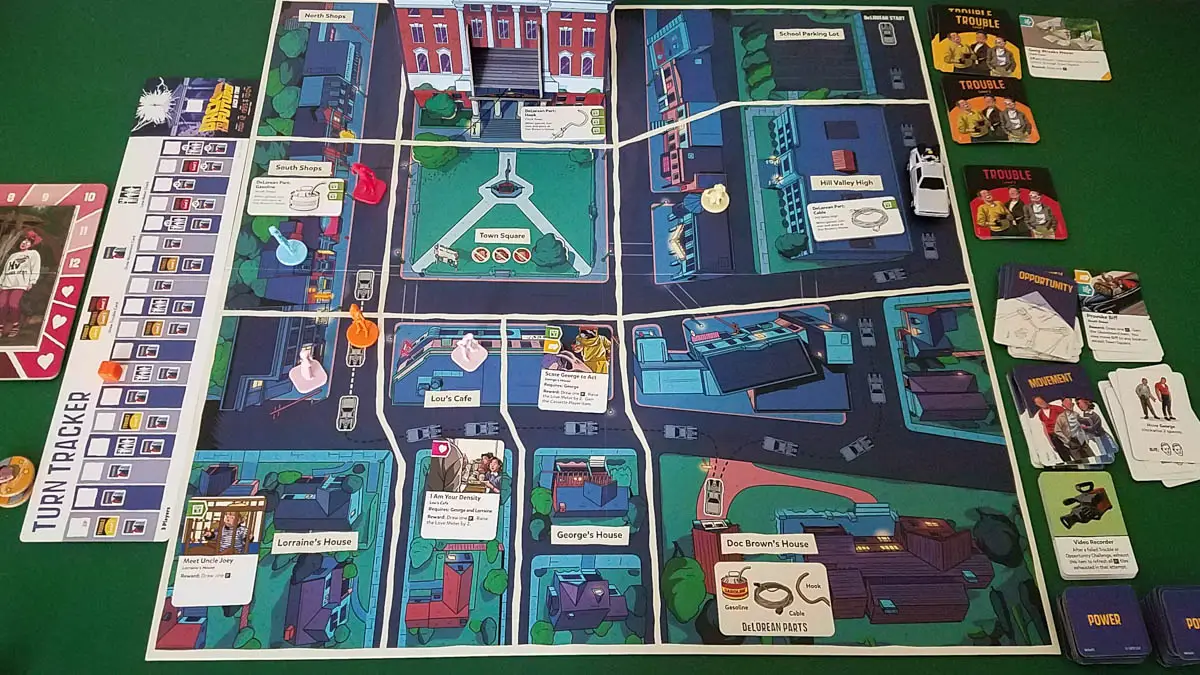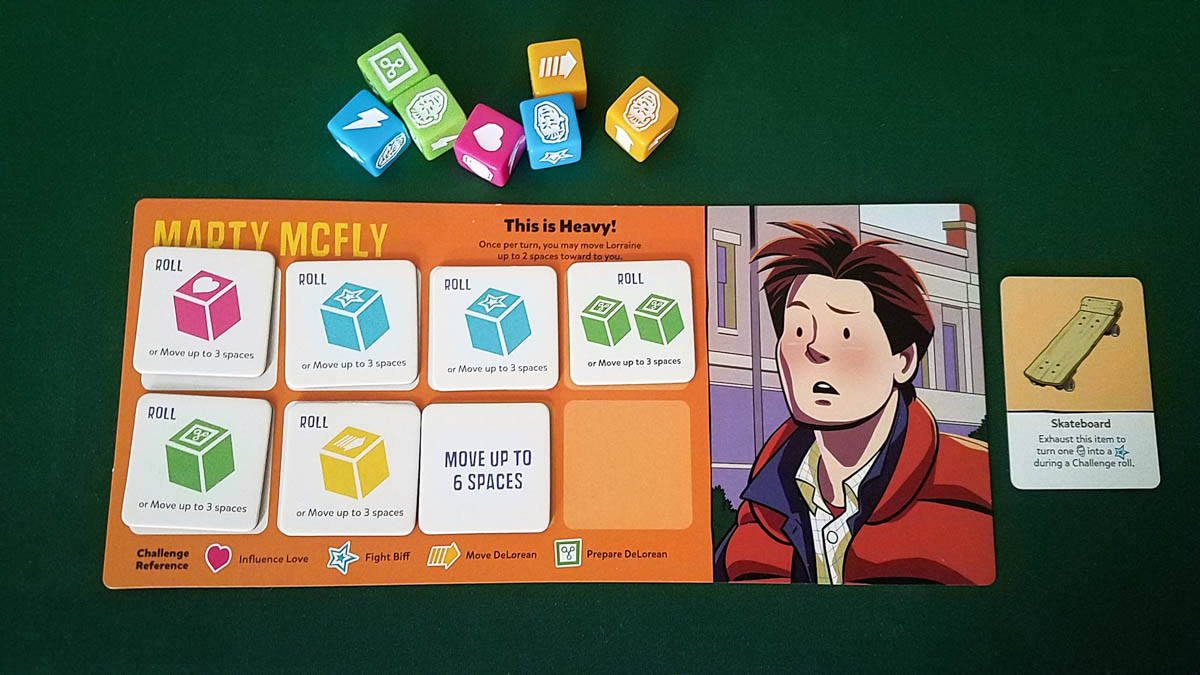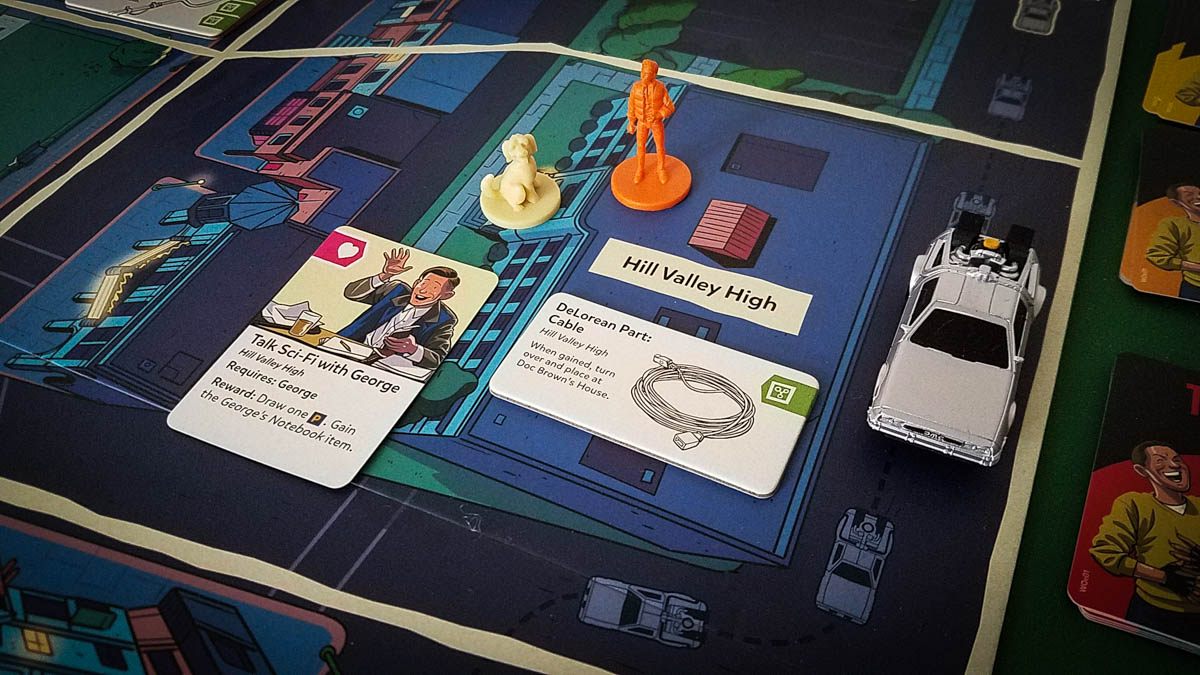Back to the Future: Back in Time Review
Year: 2020 | Players: 2-4 | Minutes: 50 | Ages: 10+
This Back to the Future: Back in Time review was made after playing the game seven times (three 2-player games and four 3-player games).
What is Back to the Future: Back in Time?
Back to the Future: Back in Time is a cooperative dice game based on the first Back to the Future film. In the game, you move around Hill Valley in 1955 attempting to get Marty McFly’s parents to fall in love and then get back to 1985 in the DeLorean.
Back to the Future: Back in Time was designed by Prospero Hall and is published by Funko Games.
Rules Overview
In Back to the Future: Back in Time, you play as two or more of Marty, Doc, Jennifer, and Einstein the dog as they try to help Marty’s parents fall in love and get the DeLorean in place on Main Street at 10:04 p.m. so they can get back to 1985. That is made a lot tougher by Biff, who will be trying to get to George and Lorraine so they can’t fall in love.
Each character has a unique special ability and a set of starting Power Tiles, which give you your initial dice pool to work with. As the game progresses, you’ll gain more Power Tiles by completing different types of challenges.
Turns have two phases:
- Turn Tracker Phase – Here you simply move the cube forward one spot on the Turn Tracker and resolve the icons shown. You’ll always have at least one Movement card to draw, which will move Biff, George, and/or Lorraine around the city. Some rounds you also have to draw a Trouble card, which is placed on the board and will have some type of ongoing negative effect. You also have to check the Love Meter during some rounds, which will result in you losing sections of the McFly family photo until you get the meter high enough.
- Action Phase – Here you use your Power Tiles and Item cards to move around and attempt different types of challenges. When you move, you can also escort George or Lorraine to put them in better locations. Challenges include attempting to raise the Love Meter when George and Lorraine are together, fighting Biff, moving the DeLorean, attempting to get the key time-traveling pieces for the DeLorean, resolving Opportunity cards, and resolving Trouble cards. When you attempt a challenge, you can flip as many available Power Tiles as you want to, roll those dice, and see how many successes you get. You can then reroll any non-Biff dice to try to get better results. There are also dice-modifier Power Tiles that you can use at this point. If another player is in your location, they can assist you by flipping their Power Tiles and/or Item cards and adding their dice to the pool. At the end of this phase, your Power Tiles and Item cards are refreshed/flipped face-up, though anyone who assisted you has to keep their tiles and cards face-down until the end of their next turn.
Every Biff icon on dice and on Movement cards moves Biff toward George or Lorraine. When he’s in the same location as one or both of them and you have to resolve one of those icons, you lower the Love Meter.
You’ll win if the DeLorean is in the Ready Zone on the board at 10:04 p.m. and the Love Meter is somewhere in the Heart Zone. You’ll lose if you don’t have everything ready at 10:04 or if the sixth and final section of the McFly Photo is ever flipped face-down.
For more info on how the game plays, take a look at the Back to the Future: Back in Time rulebook at BGG.
Pros and Cons
Pros
- What surprised me the most about Back to the Future: Back in Time is how well it captures the theme of the movie. Biff is as annoying as he should be, all of the cards have items or popular scenes from the movie on them, and it isn’t easy to get George and Lorraine together (great idea to include the fading McFly family photo). It all just works.
- The tension stays pretty high as you play through the game. Biff is strong from the beginning and just keeps getting stronger thanks to those Trouble cards. Plus, the board state constantly changes, making completing those main objectives that much tougher. All of that creates a challenging puzzle to work through each game.
- It feels great to assist other players on their turns and you definitely do appreciate it when other players sacrifice their own tiles and cards to help you out. The game would probably work even without this mechanic, but it adds an extra layer of cooperation, which, to me, is always a good thing.
- I’m also a big fan of the Opportunity cards. They give great rewards that can help you win the game, but you also run the risk of wasting your turn if you aren’t able to complete their challenges.
- Another thing this game does well is give you plenty of ways to mitigate your bad dice rolls. You can reroll as much as you want to as long as you don’t roll those Biff symbols, and there are Power Tiles that let you reroll Biffs and change icons into different icons.
- This game does scale well for different player counts. The Turn Tracker is different for each player count, so the challenge (and the game length) is pretty much the same. I’ve only played it at two and three players so far, but it’s pretty obvious to me that it’d work just as well with four.
- I think the character art, the card art, and the board look amazing. I really like the art style they chose to use and I’m really glad they didn’t use stills from the movie.
- The mini DeLorean is awesome!
Cons
- I pointed out that there are multiple dice modifiers, which is great, but the dice randomness can hurt you pretty bad early in the game and that seems to greatly decrease your chance of winning. If your team rolls poorly early on and you aren’t able to get new powers and items, it can feel like you’re playing catch-up for the rest of the game. We only had that happen once, but it ended up being a terrible loss and we pretty much knew we were going to lose after some pretty bad rolls during the first five or six turns. One feel-bad game out of seven isn’t too bad, though.
- They didn’t include ways to adjust the difficulty in the rulebook. It is a very challenging game, but I don’t like that we won’t have a way to make it tougher if we ever do get really good at it.
- The Biff and George miniatures look strange to me. Biff looks like a zombified version of Drago from Rocky and George just looks like an old zombie.
Final Thoughts
I’m a huge Back to the Future fan, so I was so happy that Back to the Future: Back in Time ended up nailing the theme… and being a fun game to play. It requires good teamwork to beat, there’s a nice amount of tension throughout, and I think it looks great on the table. Besides that one stinker I mentioned, my group has had a blast playing this one.
If you like dice games and/or you think you and your group would enjoy a family-weight Back to the Future co-op, I highly recommend checking out Back to the Future: Back in Time. It’s one of my top cooperative games of 2020.
- Update: Back to the Future: Back in Time was added to our Best Cheap Board Games list!
- Update 2: It’s now on the Best Three-Player Board Games list!
Back to the Future: Back in Time Links
BGG | Amazon | Noble Knight
Thanks for taking the time to read our Back to the Future: Back in Time review!
Be sure to also take a look at our Best Cooperative Board Games list and the other board game rankings.
Subscribe to our newsletter if you want more co-op board game content sent right to your inbox!
